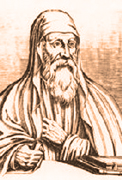Lectio Divina as School of Prayer
6. Sons of the Church of Egypt and of Alexandria
This manner of understanding Scripture as Rule of life was not, moreover, peculiar to monks. We must not forget that the Fathers of the Desert who are known to us through the Apophthegmata, the Pachomian literature, Palladius and Cassian, etc. are above all Egyptian monks of the end of the third and the beginning of the fourth century. These monks are sons of the Church. They belong to a specific Church, that of Egypt, formed in the spiritual tradition of Alexandria.
 The myth according to which most of the first monks, beginning with Antony, were illiterate and ignorant, no longer stands up to scientific research. Many recent studies, particularly those of Samuel Rubenson on the Letters of Antony, have shown that Antony and the first monks of the Desert of Egypt had assimilated the spiritual teaching of the Church of Alexandria, which was still profoundly marked by the teaching of the great masters of the School of Alexandria, and in particular by the mystical inspiration given it by its most illustrious master, the great Origen.
The myth according to which most of the first monks, beginning with Antony, were illiterate and ignorant, no longer stands up to scientific research. Many recent studies, particularly those of Samuel Rubenson on the Letters of Antony, have shown that Antony and the first monks of the Desert of Egypt had assimilated the spiritual teaching of the Church of Alexandria, which was still profoundly marked by the teaching of the great masters of the School of Alexandria, and in particular by the mystical inspiration given it by its most illustrious master, the great Origen.
The Church of Alexandria was born from the first generation of Christianity in the heart of a highly educated Jewish diaspora counting, according to Pliny, about a million members; this explains the fact that this Church of Alexandria and of Egypt had from the beginning a very marked Judeo-Christian orientation. It explains at the same time its openness to the scriptural and mystical tradition that had marked the Judeo-Christian Churches of the first generations of Christians..
The School of the Desert is, from many points of view, the replica in solitude of the School of Alexandria where we know that Origen had lived with his disciples a form of monastic life completely centered on the Word of God. According to a beautiful description of Jerome’s, this life was a continual alternation between prayer and reading, reading and prayer, night and day. (♦ 43,1; PL 22:478: Hoc diebus egisse et noctibus, ut et lectio orationem exciperet, et oratio lectionem.)
Nor was this peculiar to Egypt. At almost the same time Cyprian of Carthage was formulating a rule which would later be quoted by almost all the Latin Fathers: “Either pray assiduously or read assiduously; sometimes speak to God, at other times listen to God speaking to you” (Letter 1,15; P.L.4:221 B: Sit tibi vel oratio assidua vel lectio: nunc cum Deo loquere, nunc Deus tecum – which became the classic formula: “when you pray, you speak to God, when you read, God speaks to you”).
If all the Egyptian monks were not Evagrius, and if few among them must have read Origen in the text, the fact remains that they were formed to Christian spirituality by the teaching of pastors who remained strongly influenced by the orientation Origen had given to the Church of Alexandria through the School which he directed there for many years.
That explains the solid biblical spirituality of primitive monasticism. One could object immediately that biblical quotations are, when all is said and done, few enough in the Apophthegmata, even though they are much more frequent in the Pachomian literature. The answer is that Scripture had so fashioned the manner of life of these ascetics, that it would be superfluous to quote passages from it. The Apneumatophoros monk was the one who, living according to the Scriptures, was filled with the same Spirit as had inspired the Scriptures. (They were far then from the modern custom which demands that no statement, no teaching be taken seriously unless it is embellished with a footnote indicating all the people who have said the same thing before us.)

Leave a Reply